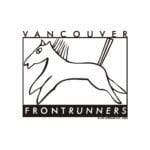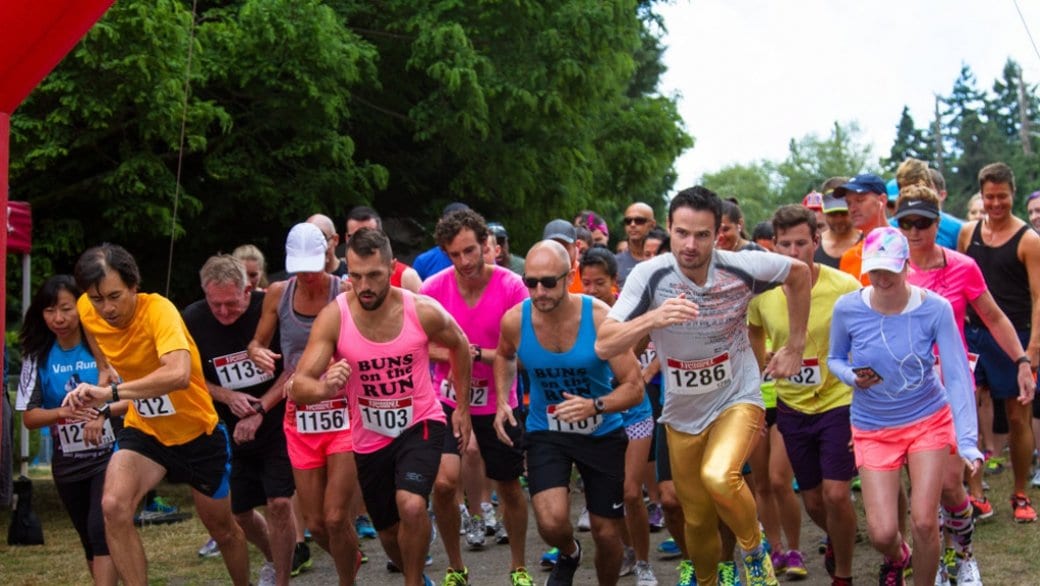This story was created by Xtra's branded content team alongside Vancouver Frontrunners, separate from Xtra's editorial staff.
The frontline of any social movement can be a lonely place, but at the Vancouver Pride Run and Walk rest assured that friends and allies are right there with you. This is due in part to the work done by Vancouver Frontrunners, an inclusive running club leading the way for trans inclusivity in sports.
Kai Scott is one of the people behind Frontrunners’ new gender-variant category. When we caught up with Scott, he was “excited, encouraged, and in need of some sleep,” after a long day at Vancouver city hall, where city councillors unanimously passed a trans inclusion report that Kai co-authored.
This interview has been edited and condensed for clarity.
Daily Xtra: Congratulations on getting the report passed! Can you talk a bit about the sorts of things you discuss in the report regarding sports-specific challenges trans and gender-variant people face?
There is a general theme of a lack of self-determination and options to allow trans people to access the spaces, programs and support they need and want. Most sports are based on the gender binary of male and female, which presents issues for trans people moving between this binary and altogether excludes gender-variant people, who don’t identify along the binary.
Trans people also face issues accessing the washroom or change rooms that align with their gender identity. This may entail being harassed or assaulted within multi-stall gender-designated facilities and a lack of universal spaces that would support gender-variant or a binary trans person in early transition or wanting increased privacy.
Furthermore, application forms for various sports activities and/or sporting events usually only have binary options.
In response to these challenges, you introduced a third gender category for Vancouver Pride Run and Walk. Why these changes specifically?
The Vancouver Pride Run and Walk is a fun community event meant to celebrate our beautiful diversity, resilience and strength. Three years ago, Frontrunners looked critically at where there were gaps in achieving one of our main objectives of inclusivity and we discovered a lack of options in gender categories. We also noticed there was no explicit inclusion of binary trans people within the male and female categories.
What else has Frontrunners been doing to improve trans inclusivity in the Pride Run and Walk and at club meetings?
We looked at the washrooms at the event to ensure there were ample universal options, and trained volunteers to be equipped to interact and direct participants to meet their needs.
At Frontrunners, we’ve worked out the details of the change room after our runs so people of all genders can join us for post-exercise meals.
You do brunch on Saturdays and dinner on Wednesdays post-run?
Yes. Sharing meals and stories is a key part of our social fabric. For many trans people, social isolation is a chronic and debilitating issue. If people did not have access to showers, this would severely impede their ability to join in the revelry and deepen social bonds in the club.
Vancouver Frontrunners is not only a place to find other queer and trans people to exercise with, it also provides important social and emotional supports.
Have you seen other organizations making positive policy changes?
There are now larger racing events in Vancouver that are looking to replicate or adopt what we started with the Vancouver Pride Run and Walk. And we may see changes on larger scales beyond queer and trans communities. Sometimes it’s about boldly leading the way and exploring something out of the box as a way of inspiring others to follow.
Our thinking was that if we as queer and trans communities cannot figure it out, how can we expect cisgender and straight people in general society to come up with the solutions? We must lead by example, even if we do not have all the answers from the outset.
Absolutely! So, what’s next?
There’s still a long way to go within sport for true trans and gender-variant inclusion. In addition to relaxing and expanding gender categories, sports leagues need to provide their staff with basic training in gender-identity terminology and concepts [so they’re] ready to receive and accommodate trans and gender-variant players. Trans and gender-variant people have been on the sidelines for so long that we sometimes are not sure if we are wanted or included.
Within a competitive context, there is a still a long way to go, though.
Like at the Olympic level?
Yes, the International Olympic Committee (IOC) has developed a transgender policy, but it is still restrictive. There are still no competitive options for gender-variant people to excel within their sport. This speaks to a lack of creativity and willingness to face the reality that gender and biology exist along a spectrum.
Speaking of creativity and willingness, are you donning a costume for this year’s Pride Run and Walk?
I’m volunteering at this year’s Pride Run and Walk to organize the Disco Water Station. So look out for me decked in my ’70s best, probably shirtless, dancing and handing out water to participants running and walking through Vancouver’s finest scenery.
Vancouver Pride Run and Walk is organized by Vancouver Frontrunners and the Vancouver Pride Society and takes place on July 24, 2016, with a new location and new course, marking the first official event of Vancouver Pride Week.
Vancouver Pride Run and Walk
July 24, 2016
vancouverfrontrunners.org


 Why you can trust Xtra
Why you can trust Xtra